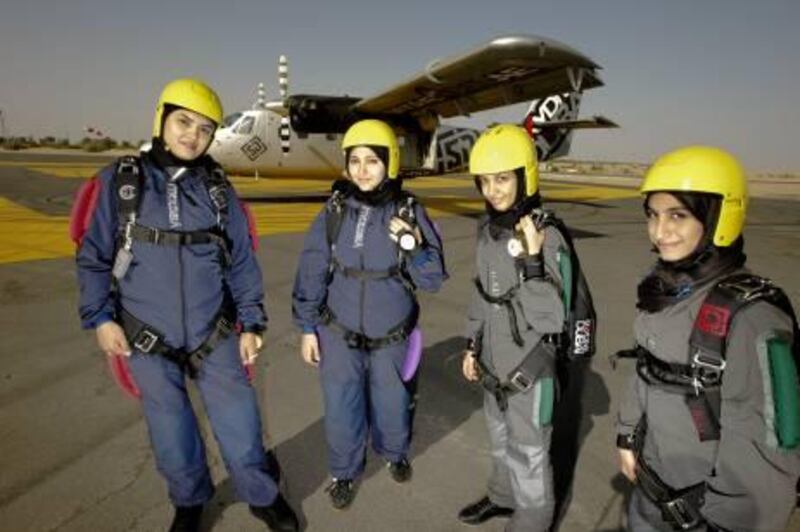DUBAI // When Radwa El Ghamry told her family she wanted to jump from a plane and glide to the ground with a parachute strapped to her back, tears began streaming from their eyes.
They thought skydiving was too dangerous and that it was an activity only for men.
"It was something strange for the whole family and they all started crying because I wanted to go jumping," she said.
Eventually, they accepted her love of the extreme sport.
Ms El Ghamry is one of four women who are flying through cultural barriers at 13,000 feet (3,962 metres).
They are the first female Arab skydiving team in the Gulf.
Ms El Ghamry and Nada Attia, both from Egypt, have joined Emiratis Shaikha Al Muhairi and Hamda Saif, both from Dubai, in training at Skydive Dubai, a skydiving facility, to become a four-way team formation. The latter are the first Emirati women to participate in the sport.
The girls, all in their late teens to early 20s, will compete against other skydivers.
"Before I came to Dubai I was in military training and we did military jumps from the sky," Ms El Ghamry said. "I always liked the sky when I was young and wanted to go to the galaxy."
She said there was no skydiving base back home, so she came to the UAE last year and joined her cousin, Ms Attia, who was doing a school project about skydiving with two of her classmates, Ms Al Muhairi and Ms Saif.
In June last year, the classmates showcased their skydiving 3D game project - which allows users to experience the feel of jumping from an aircraft without the actual action - in the Young Entrepreneur Competition.
Their project earned them recognition from Sheikh Hamdan bin Mohammed, the Crown Prince of Dubai, who is a skydiving enthusiast. They were also introduced to Skydive Dubai.
Nasr Al Niyadi, a skydiver from the Emirates Aviation Society, gifted the ladies their first tandem, a version of skydiving in which a student is connected through a harness to an instructor.
"Skydiving was the first thing I liked from sports," said Ms Al Muhairi. "It was weird at the beginning for my family but they are happy and supporting me that I am doing something new."
All four women agreed that their first skydiving experience together was phenomenal.
"After we tried the tandem, we loved it," Ms Saif said. "You feel so free up there, you can do anything you want - you flip, you turn, you circle, you can't explain how it feels.
"But at first we were afraid to go for it because we are Arabs and it's difficult to do what we do."
Through a turn of fate, Ms Saif met Chris Colwell, who spoke at TedxDubai last October about his adjustment to life as a quadriplegic following a skydiving accident in his hometown of DeLand, Florida.
"Somehow I heard about the girls and their project, so I wanted to see them, but it didn't happen," Mr Colwell said. "But one day I was at a sports shop in Deira City Centre and I heard someone behind me say, 'Chrrrrris', and it was Hamda.
"She was standing there and it was very shocking to me because she was the first woman who spoke to me wearing an abaya," he said.
Since then, the group has formed a friendship with Mr Colwell, who documents his journey on YouTube.
"I can see the passion in them, although they have a lot of fears," Mr Colwell said.
"They have many people around them that don't have the confidence and are quick to crush their ideas.
"But now they can see that anything is possible because they really want it.
"They are pioneering something and doing something that hasn't been done before, so there is a lot of pressure on them, but they are the right ones for the job."
Ms El Ghamry agreed, saying: "We want to send a message to all the girls: if you love something, you have to go for it and think about how you can do it.
"Don't accept no for an answer, but of course with respect to your religion and culture."
Ms Attia embraces the idea that the team is breaking cultural barriers.
"This is the only sport I want to continue throughout, especially because not many Arab and Muslim girls do it. So we're kind of special," she said.
Mr Colwell corrected her.
"You're not kind of special," he said. "You are special."






